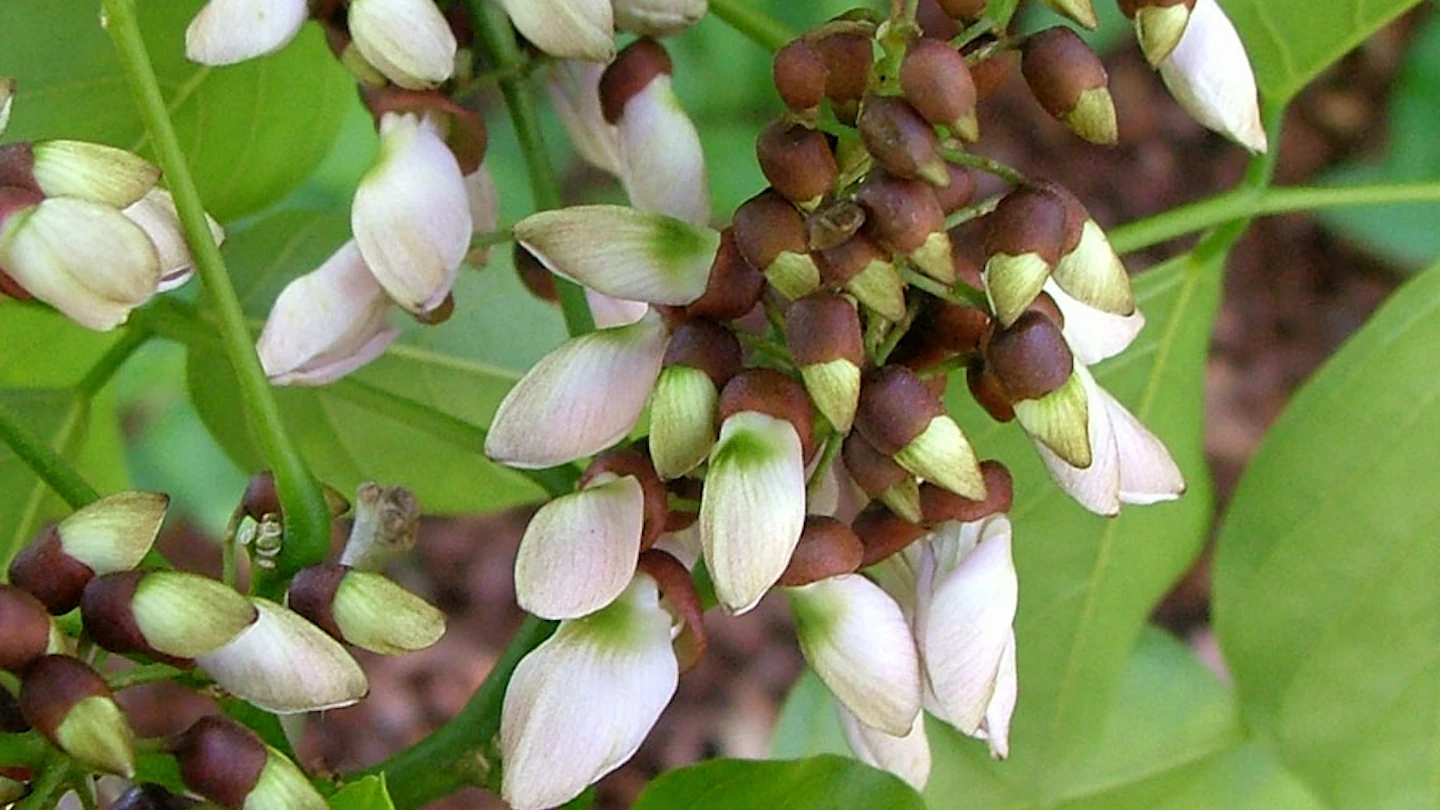
The pongomia tree bears seeds in pods that can be crushed for oil, and grows to up to 12m in height. Photo: Brisbane City Council
A PLANNED oilseed-crushing plant in Central Queensland has received a boost from the Queensland Government in funding announced this week for the state’s s growing sustainable aviation fuel (SAF) industry.
Ahead of the October 26 Queensland election, Development and Infrastructure Minister Grace Grace said Energreen Nutrition Australia will receive funding from the Qld Government’s Industry Partnership Program.
Plans for the plant, to be built at the Central Queensland Inland Port at Yamala, 25km east of Emerald, came to light early last year.
The plant is expected to be able to crush 70,000 tonnes of oilseeds a year, with a longer-term vision for to crush pongamia seeds to produce oil as a potential SAF feedstock.
Pongomia, or Millettia pinnata, is a tree native to tropical Asia and northern Australia, and is commonly known as Indian beech.
Energreen director Gary Seaton said the company’s CQ plant will crush oilseeds including cottonseed, sunflower seed, soybeans, and canola for the dual purposes of producing edible oils and biofuel feedstock.
Mr Seaton is also managing director of the recently expanded Cootamundra Oilseeds, which was founded in the 1990s to crush canola in southern New South Wales.
“Energreen is working closely with local farmers and plant breeders to rejuvenate the oilseeds industry in Queensland,” Mr Seaton said.
“Our ongoing pongamia trial is a key component of our strategy to integrate SAF into our operations.
“We are proud to be at the forefront of efforts to reduce carbon emissions and promote sustainable energy solutions in the food and feed industry, as well as in sustainable bio-fuel feedstock production systems, to build domestic capacity in Australia.”
Under Premier Stephen Miles, the Qld Government is also providing funding to both Wagner Sustainable Fuels and Liquid Power, with grants of $760,000 each for feasibility studies to develop the case for investment in their own SAF proposals.
“Queensland is recognised internationally as one of the best locations to establish an Australasian SAF supply chain because it already produces significant SAF feedstock and has a state government prepared to back the industry,” the Qld Government said in a statement.
As well as collaborating on the growth of a Queensland SAF industry through a key partnership with Qantas, the Miles Government has provided support for Jet Zero’s feasibility study for a biorefinery in the Townsville State Development Area.
It is also working with Ampol to investigate the production of renewable diesel and SAF at its Lytton refinery in Brisbane.
IPP funding has now reached $415.5 million and is focused on growing priority industries, strengthening local supply chains, encouraging collaboration between all levels of government and industry, and leveraging private sector investment.
“I am proud to see us pioneering practical solutions that promise a cleaner, greener aviation future, while delivering significant economic benefits for Queenslanders,” Ms Grace said.
“Through IPP we supported Jet Zero Australia with $760,000 for a feasibility study, who have since leveraged that support to attract significant investment from partners like Qantas, Airbus Industries, and Japanese industrial giant Idemitsu Kosan.
“Jet Zero has now announced their intention to establish a SAF processing facility in the Townsville Region.
“We are well on the way to establishing Queensland as a green jet fuel hub for the Asia-Pacific region.”
Qantas group chief sustainability officer Andrew Parker said Qantas has a target of using 10 percent SAF by 2030, which is around 600 million litres each year, and the four projects in the Queensland pipeline could made a significant contribution to these requirements.
“A Queensland-based biofuel refinery was the first project that Qantas invested in through our $400 million Climate Fund and we’ll continue to invest in and advocate for Australian SAF production,” Mr Parker said.
“Australia needs to keep pace with other leading jurisdictions who are introducing SAF mandates and supply-side policies to capitalise on job creation, economic growth and national fuel security.”
Earlier this year, global aerospace company Boeing and Wagner Sustainable Fuels announced they had partnered to develop a SAF facility at Wagners’ Wellcamp facility near Toowoomba.
“Wagner Sustainable Fuels is delighted to partner with the Queensland Government to advance the Wagner SAF Refinery, Brisbane,” Wagner Sustainable Fuels chief executive officer Matt Doyle said.
“This exciting facility further highlights the Queensland Government’s leadership in advancing SAF in Australia.
“It is also a further step forward for Wagner Sustainable Fuels following our commencement of a SAF blending facility at the Wellcamp Airport to support Wagner Corporation’s climate positive commitments for the Wellcamp Airport and Business Park and our recent partnership announcement with Boeing to advance the SAF industry in Australia.”
Liquid Power Development director Brendan Giles said the company was grateful for s support from the Qld Government as it expands its sustainable fuels capabilities.
“As an emerging industry, assistance at this early stage is critical to establishing our first production facility and growing our low-carbon fuel platform.”
Qld already produces significant feedstock needed to make SAF, including tallow, sugarcane waste pulp and cereal cropping residues.
SAF can be used in existing aircraft engines and airport refuelling infrastructure to cut carbon emissions.
Source: Queensland Government and Grain Central

HAVE YOUR SAY